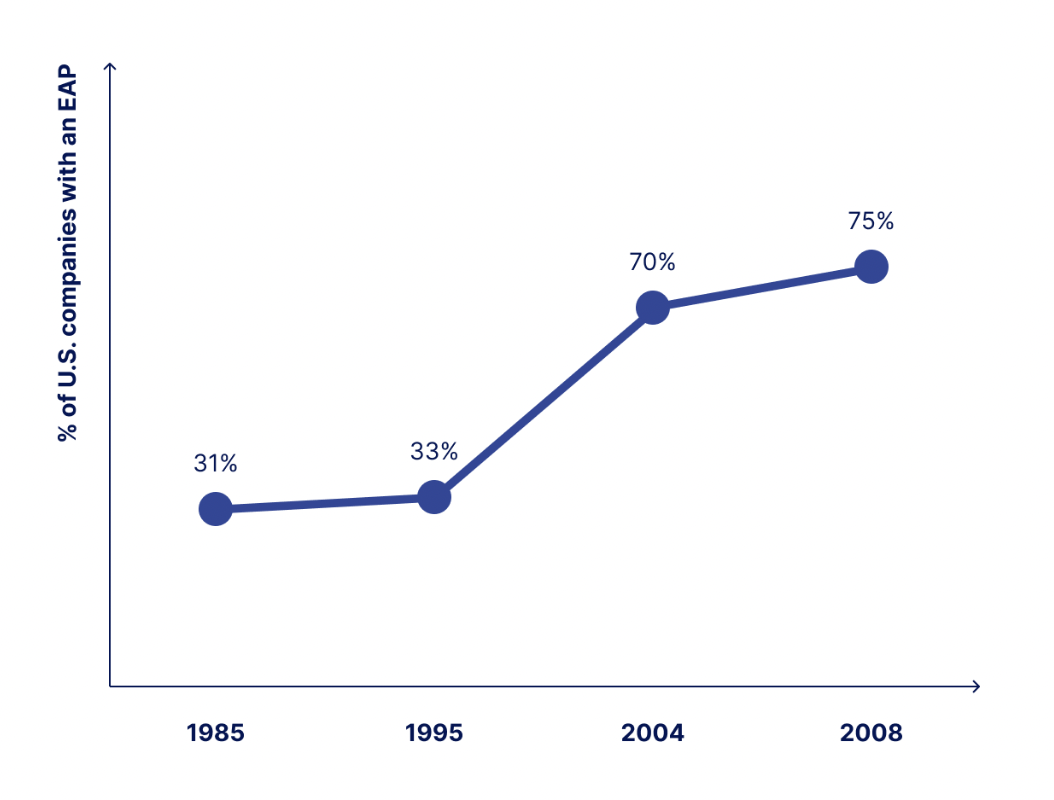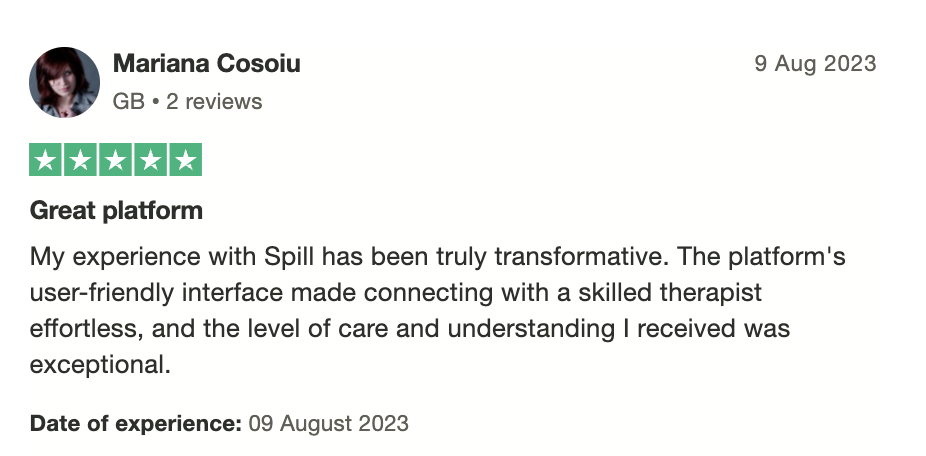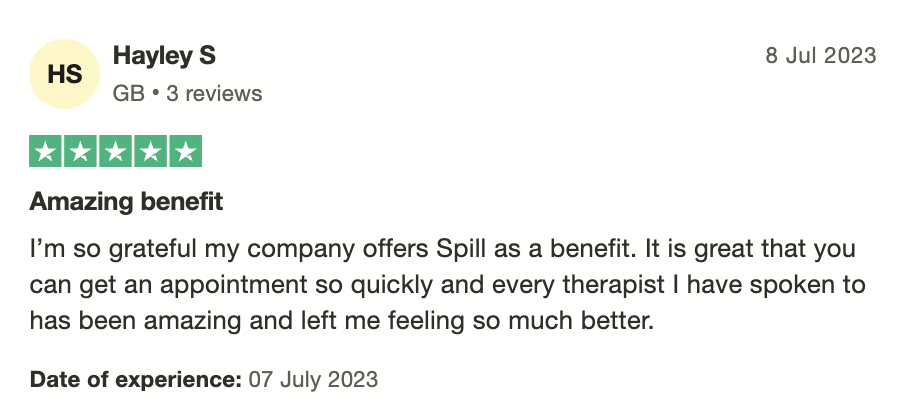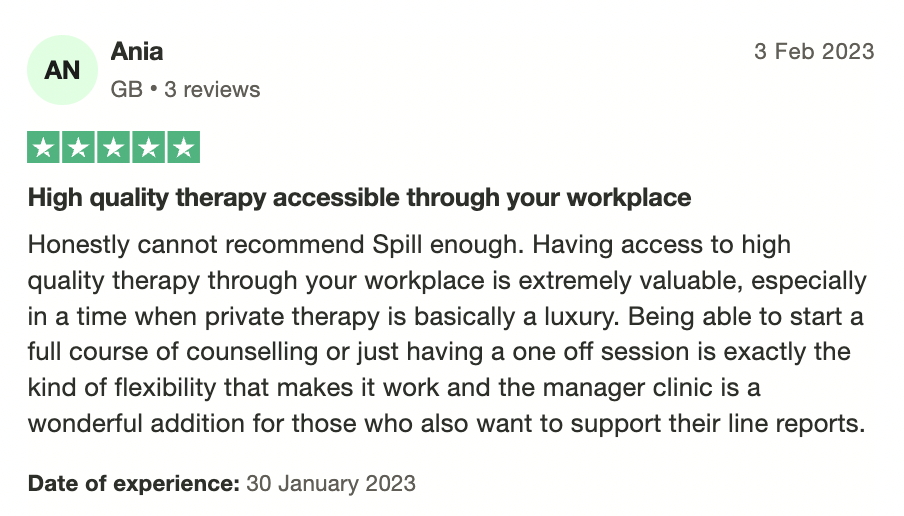See how much Spill's employee assistance programme would cost your business
See pricingWhat is an Employee assistance programme (EAP)?
Let's start by understanding the basics of what EAP services or employee assistance programmes are, why companies use them, and how they came into being.
EAP is short for employee assistance programme (if you’re British) or employee assistance program (if you’re American).
An employee assistance programme (EAP) is a service that organisations can pay for to give their employees access to short-term counselling and other professional guidance.
Interestingly, employee assistance programmes began life in the 1930s as programmes to help workers overcome alcoholism, but have since broadened their scope and now aim to help employees with all sorts of mental health issues, life events and legal issues that might be affecting their performance at work. According to experts, however, the vast majority of employees use EAPs specifically for the mental health benefits.
What can an EAP support with?
EAP services can be used to support anyone within your company who's struggling with personal or professional issues affecting their overall wellbeing and job performance. That could include:
- Work-related challenges like stress, burnout or interpersonal conflicts.
- Personal challenges from difficulty sleeping to dealing with trauma or addiction.
- Mental health conditions like anxiety, depression or ADHD.
- Life events like like having a baby, going through a divorce or experiencing a bereavement.
An employee assistance programme is not just a lifeline for employees in crisis, but also a proactive resource for anyone needing support, guidance, professional advice or a safe space to be heard.
Is an employee assistance programme (EAP) mandatory in the UK?
No, EAPs are not mandatory in either the UK or the US. However, UK employers do have a legal requirement to ensure the wellbeing of their employees. This is known as a duty of care, with specific responsibilities relating to health and safety, harassment and stress.
EAPs exist to help employers fulfil this duty of care and offer employees a layer of protection from any psychologial risks within the workplace. For this reason, they have become practically ubiquitous.
Following 9/11 and the financial crisis of 2007-8, as well as the move towards external rather than internal programmes, EAP adoption rates jumped, with 3 in 4 U.S. companies having an EAP by the late 2000s.
With the advent of the internet and the spread of globalisation, EAPs moved from becoming a U.S. phenomenon to a worldwide one. Nowadays EAPs are commonplace around the globe: 88% of all U.K. employers now have an EAP, and for bigger employers (those with over 5,000 employees) that figure goes up to 97%.

How do employee assistance programmes work?
EAP services are designed to support employees who may be experiencing personal or professional issues that could affect their performance at work, health, or wellbeing. This support can take the form of counselling, self-help resources, training, and guidance from other trained professionals.
Different EAP services work in slightly different ways when it comes to the exact process of how support is accessed and used.
How do you access an EAP service?
Most EAP services provide a phone number that employees of a paying organisation can call to for emotional or practical support. Some modern EAP providers like Spill can also integrate with your existing company communication tools to enable employees to speak to a counsellor directly from Slack or Teams, without having to remember any log in details or hunt down a phone number from HR.
With some EAP providers it’ll be a trained counsellor (or another type of expert, such as a legal or financial advisor) who usually answers the phone, whereas with other EAP providers it’ll be a regular call centre worker, who might be called an EAP consultant or advisor. If you’re looking to buy an EAP, it’s worth investigating whether your preferred provider has trained counsellors or call centre workers answering the phones as this can have a big impact on the overall experience for your team.
With some EAP services a trained counsellor will answer the phone; with others it’ll be a call centre worker.
During this initial triage call, they’ll usually ask a few questions about why the employee is calling to gather relevant information and figure out the best course of action for their needs.
How do you use an EAP service?
If you’re using an EAP that has trained counsellors answering the phone, and if the issue your employee is calling about doesn’t require a course of structured sessions, they can sometimes get support over the phone during the first call. This is called in-moment support. The counsellor will give them the space to talk through their concerns, and then might provide guidance or tips and techniques to help them out, or point them towards online self-help resources provided by the EAP. If they would rather request a course of structured EAP counselling sessions, the next step is to do a clinical assessment.
If you’re using an EAP that has call centre workers answering the phone, or if all your EAP’s trained counsellors are busy at the time you call, you’ll need to do an assessment or request a callback before being able to use the EAP’s counselling services. Alternatively, you might be able to access online self-help resources if your EAP provides those too.
If you do an assessment (which usually also takes place over the phone and for some EAP providers takes around 20 minutes), you might then be referred on for a course of short-term counselling or another type of short-term support, such as a call with a legal or financial advisor.
What services do employee assistance programmes (EAPs) provide?
Employee assistance programmes (EAPs) provide a range of confidential support services to employees to help them deal with personal or work-related issues that may impact their job performance or emotional wellbeing.
By definition all EAPs should be:
- Free of charge for employees at point of use (the service is paid for by the company)
- Fully confidential (although this one's worth researching in light of recent scandals)
- Available 24/7 (including evenings and weekends)
- Inclusive (available to all employees, for support with any personal or professional issue that's affecting their mental health – no matter how severe)
Let's look at the typical services offered by EAPs:
EAP counselling services
Access to short-term counselling for mental health issues is the core service that EAPs provide. All EAPs should offer this as standard. A scan through some of the most popular EAP providers’ T&Cs gives the consensus that between six and eight counselling sessions per person per year seems to be the norm, with most providers offering counselling sessions over the phone or in person — although the availability of in-person sessions depends very much on where the employee lives.
There’s an important distinction between short-term counselling and longer-term treatment. Short-term counselling is time limited: it usually runs for a maximum of six sessions and focuses on one specific issue e.g. stress, relationship challenges or a bereavement. Longer-term treatment on the other hand isn’t time bound and can take place over a period of weeks or months, usually to support ongoing or severe mental health conditions such as depression, anxiety or addiction. This is usually available as an optional add-on.
Whether an employee is able to access counselling depends on whether they meet your EAP’s eligibility criteria. Although some EAPs do publish example usage data for small subsets of their customer base, we couldn’t find an EAP that made its eligibility criteria or overall usage data public. Spill, on the other hand, was available to just over 30,000 employees in 2024 and provided 26,000 therapy sessions to them during that year.
Perhaps the reason that most EAP providers don’t shout about these numbers is because they don’t actually provide that much counselling. Although about 10% of employees typically contact their EAP in a year, according to an EAPA report, it’s estimated that only about a fifth of those who contact the EAP (so 2% overall) are actually offered counselling sessions, as an estimated 60% of callers are signposted towards self-help resources instead, based on the results of their assessment. And for those who are offered counselling sessions, many EAPs simply send over contact details for the counsellor and leave it up to the employee to book in the sessions, meaning it’s likely to be an even smaller number still who actually end up having them.
EAP legal and financial advice
Most of us won’t generally know how to deal with financial or legal issues until we have to, and knowing that there’s initial advice available for free can be a huge comfort during a difficult time. While not legal or financial representation, EAPs can offer professional advice on debt management, budgeting, family law, estate planning, consumer rights, and more, via phone calls with an expert or again, via self-help content resources online or an app.
EAP crisis intervention
Some events can have an altogether different impact on your employees’ mental health, and these can require immediate attention. Many EAPs offer support for ‘crisis’ situations such as natural disasters, violence, or the sudden death of a coworker. Having access to immediate help can go a long way in supporting the recovery journey, and help mitigate the impact on mental health and job performance.
EAP manager training
Some EAPs also offer training workshops and seminars for managers and leaders within your company. EAP manager training is usually designed to give managers the skills to effectively support and signpost any employees who might be struggling towards available resources. This can be an effective way of increasing awareness and usage of the EAP, and making sure no-one slips through the net.
EAP self-guided content
Most EAPs give employees access to a library of resources which they can access any time for expert advice and guidance across a range of topics. This can be particularly useful for those who don't feel comfortable booking a counselling session right away, but still need support with day-to-day challenges like switching off from work or sleeping better at night.
EAP neurodiversity support
With 1 in 5 people employees now estimated to be neurodivergent in some way, some EAPs have responded by developing specialised support for for ADHD, autism, dyslexia and other cognitive differences.
- PAM Wellbeing offer a range of neurodiversity solutions including workplace needs assessments, awareness training and coaching.
- Health Assured provide neurodiversity workshops and training – but when it comes to tailored counselling support for individuals they say "as a service we provide non-specialist counselling support, so if a client has concerns relating to neurodiversity, we would explore the issues they are facing rather than focusing solely on their condition".
- Spill specialises in tailored EAP support for neurodiverse employees (with or without a diagnosis), matching individuals with a specific counsellor who has extensive experience supporting people with their condition to build a bespoke support plan. Spill also gives employers the option to co-pay for a private ADHD assessment to help make this service more accessible for their employees (and jump the 8 year NHS waiting list for a diagnosis).
Remember, this is a broad overview of all the potential things an EAP can include. When choosing your company’s EAP provider, be sure to weigh up the services that will most benefit your team.
What services aren’t covered by an EAP?
EAPs tick a lot of boxes and it’s one of the reasons why so many companies have one. However, there are some things that are point blank not included in any EAP provider’s offering:
- Medical treatment: EAPs are not a substitute for general medical or emergency care, and don’t cover medical expenses. They also don’t provide access to psychiatrists: counsellors on an EAP cannot diagnose mental conditions or prescribe any form of medication.
- Legal representation: While your team can get professional legal advice or referrals, EAPs don’t provide legal representation in court.
- Financial support: EAPs can offer financial counselling, advice, or referrals but they do not provide financial assistance like loans or grants.
- Long-term counselling or therapy: The counselling available via EAPs is typically short-term, meaning employees are limited to a few sessions each year. There are exceptions however, and providers like Spill do offer longer-term treatment for more severe cases as an optional add on.
- Childcare: EAPs can give advice on childcare services and even referrals to local services, but they don’t offer it themselves.
EAP exemptions and exclusions to watch out for
It's important to be aware of any policy exclusions that might come as a surprise. Most notably, similar to the physical healthcare insurance model, some EAPs will turn employees away if they mention anything that resembles a pre-existing condition. When it comes to mental health, there can be a grey area with regard to whether something is a pre-existing condition: take the example of someone who has previously been on antidepressants but made a full recovery, but then years later has a bereavement and starts feeling depressed.
BUPA’s EAP service excludes all learning difficulties and behavioural or developmental conditions (like autism and ADHD), for example.
AXA’s EAP service says that “as with most private healthcare plans, there are exclusions and limitations” on what can be covered, and that access is “subject to medical history”.
Each EAP decides what its own criteria are for assessing who gets access to counselling, and what level a person needs to score against those criteria. These criteria and the required levels aren’t made public in most cases.
Spill is one of the only EAP providers that publicly states they don't turn anyone away from counselling for being too severe or not meeting certain criteria.
What sets Spill apart from other EAP services?
Spill is the UK's highest rated employee assistance programme (EAP) according to Trustpilot reviews from people who've used the service.
So what makes Spill's EAP service better than other providers? If you read through these reviews there are a few key themes:
1. It's incredibly easy to access support
For most EAPs, only 3% of employees in any given company will actually use the service. This is because they make it very difficult to access the support that's available (by design in most cases, to keep costs down). Employees usually have to request log in details or a phone number from HR, which compromises confidentiality and puts many people off all-together. Online reviews also reference long wait times to speak to a counsellor, with many people waiting around for several weeks for someone to return their call.
At Spill we believe that when someone is struggling, they shouldn't have to fight to get the help they need. Our Slack and Teams integrations make it incredibly easy for employees to speak to a counsellor in just a few clicks, and remain completely anonymous, with no log in details or phone numbers needed.

2. Employees are speaking to a senior counsellor who is known to the business
To access counselling through an EAP, most providers require employees to have a triage call with a case manager before they can be referred on for support. Case managers are usually non-clinicians and have targets for how many people they are actually allowed to put through for counselling (generally only being allowed to put through 20% of employees they speak to). They can turn employees away for having issues that are “too small to meet the threshold for mental health support” or “too complicated for our service”.
At Spill, we assign a dedicated senior counsellor to every business who will be accessible to the team whenever they need via Slack, Teams, Email or video call. This person is a fully qualified counsellor who's worked at Spill for at least 2 years and has experience working with similar companies, so you know your team will only ever be speaking to a professional who has their best interests at heart. And because they are integrated into the business, this builds familiarity and helps employees feel safe and comfortable reaching out for support.

3. The platform is purpose built to support smaller teams
Running the HR department as a one-person band can be a huge challenge. Between building out policies, hiring, training – and in some cases, office management – it can feel impossible to keep an eye on culture and wellbeing, and check in regularly with how every employee is feeling.
Many of the UK's largest EAP services are built to with big companies in mind. They usually have a scaled pricing model where the cost per employee is much higher for smaller companies, and many require a minimum number of 250+ employees in order to sign up.
At Spill, we intentionally focus on supporting the other end of the market and build every feature with smaller companies in mind. That's why we integrate with platforms like Slack and Teams, and have a direct line of contact for people managers and HR teams (who are often very stretched, and shouldering a lot of responsibility when it comes to supporting employee wellbeing) to get advice from a counsellor on how to best support their direct reports and signpost people towards professional support. Managers shouldn't be expected to be therapists, that's what we're here for!

4. You can change or cancel your plan at any time with just 30 days notice
We are strongly against locking customers in to a contract for 2-5 years and charging a hefty exit fee for anyone who wants to leave early.
At Spill we're proud to be the only EAP service which offers a rolling 30 day contract to make it easy for customers to change or cancel their plan at any time if they no longer feel like we're the right fit.
Most of our customers stay with us for many years, and to this day our main growth channel is word of mouth and positive recommendations from people who use (and love) the platform.
See Spill in action
To hear more about our EAP services and learn how Spill could support your team's mental health, book a free 30 minute demo.

.png)


